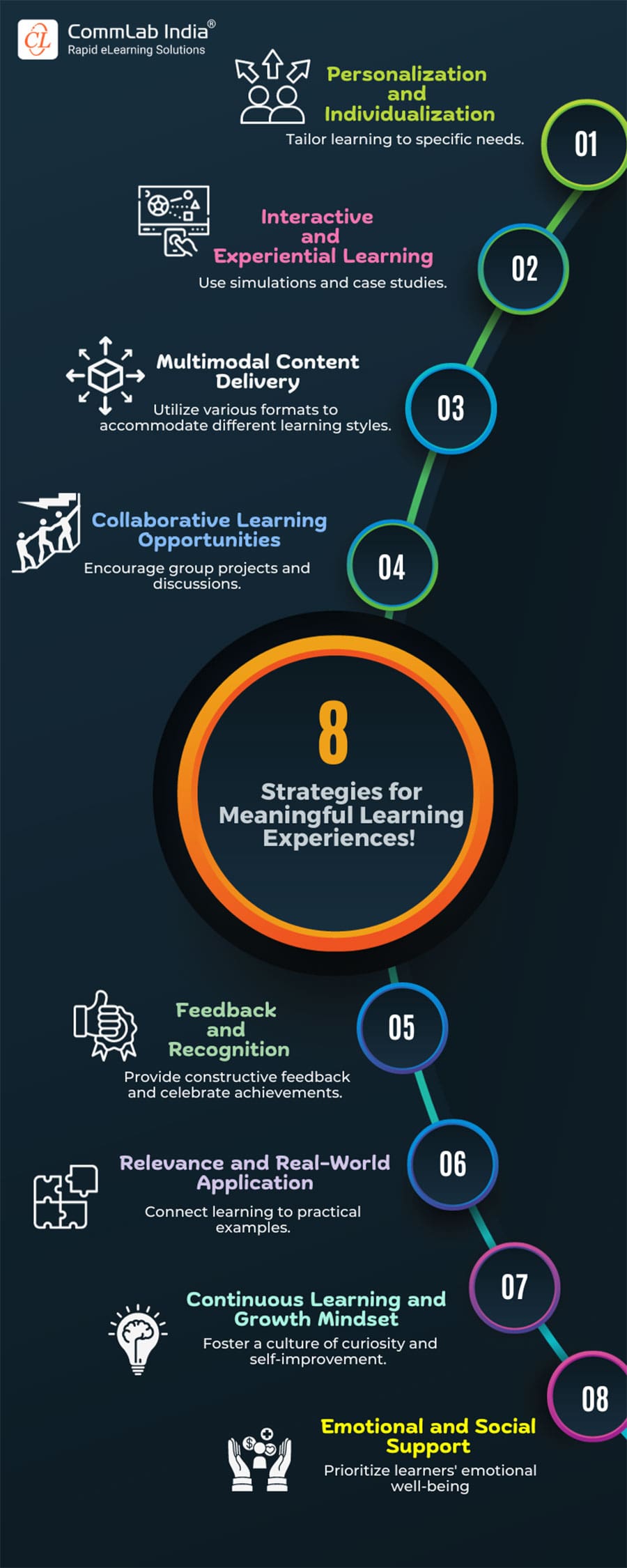8 Instructional Design Strategies for Meaningful Learning Experiences [Infographic]
![8 Instructional Design Strategies for Meaningful Learning Experiences [Infographic] 8 Instructional Design Strategies for Meaningful Learning Experiences [Infographic]](https://blog.commlabindia.com/hubfs/blogs/instructional-design-strategies-meaningful-learning-experiences-infographic.jpg)
If only learning was just about memorizing facts or answering quiz questions correctly. But in reality, it’s way more than that. Learning is about creating and finding meaning in the content that is being shared during the training programs. Therefore, ensuring meaningful learning experiences is essential to help learners grow, adapt, and succeed in a rapidly changing business world.
→ Download Now: How L&D And Business Can Align to Conquer The Future Of Work
To facilitate meaningful learning experiences, training managers should focus on fostering critical thinking, problem-solving skills, and a deep understanding of the subject matter. In this blog, we will take a look at the eight effective strategies for creating meaningful learning experiences and then discuss the top five benefits of doing so.
Let’s begin!
8 Strategies for Meaningful Learning Experiences
Top 5 Benefits of Creating Meaningful Learning Experiences
Improve Retention
When learners find meaning in what they are learning, they are more likely to remember and apply that knowledge. This leads to better concept application and long-term retention. All these factors combine to improve productivity and performance.
Enhance Critical Thinking
In today’s work scenario, critical thinking is a skill that’s a must. It stimulates curiosity, enables problem-solving, improves decision-making, and paves the way for creativity, too. The key to improving critical thinking among learners lies in meaningful learning experiences. Providing them with opportunities through interactive methods like scenario-based or game-based learning to analyze information helps them become problem solvers, capable of addressing complex challenges confidently and successfully.
Boost Engagement and Motivation
When employees see the value in their training courses and realize how the training can actually help them achieve their goals, they are more motivated to learn. Moreover, they pay attention to the information being conveyed and actively participate in the training session. This boosts learner engagement and training outcomes.
Foster a Growth Mindset
By providing a glimpse of real-world relevance and practical application, meaningful learning experiences enable learners to prepare for their future in a better way. In fact, learners can also use their skills and abilities to draw inferences and apply the learned concepts in a modified way to solve unforeseen workplace challenges. With such a strong foundation of skills and knowledge, they are able to nurture a growth mindset and move up the corporate ladder with confidence.
Enable Personal Growth
The powerful impact and takeaways of meaningful learning experiences aren’t just limited to professional life alone. They have a significant impact on learner’s personal life too. They become more confident, independent, and open to considering and accepting diverse perspectives.
Wrapping It Up!
In the 21st century, where information is overflowing almost everywhere and on every platform, creating meaningful learning experiences is vital. It is essential for equipping the learners with the skills and knowledge along with cultivating the mindset that they need to thrive in modern-day workplaces. By implementing the strategies mentioned in this blog, training managers can ensure high-impact, meaningful learning experiences for their learners that help them grow and succeed in life! Here’s a must-read to understand how L&D and business can align to achieve desired results. Check it out now!






![10 Must-Know Tips for Rapid eLearning Course Rollout [Infographic]](https://blog.commlabindia.com/hubfs/blogs/tips-rapid-elearning-course-rollout-infographic.jpg)
